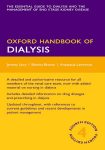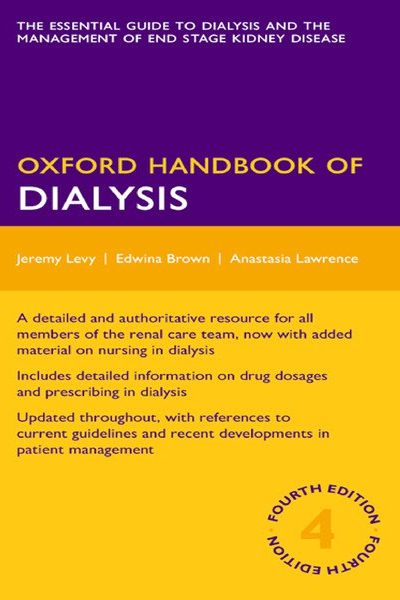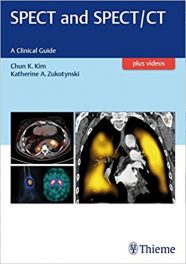 Authors and Editors: Jeremy Levy, Edwina Brown, and Anastasia Lawrence
Authors and Editors: Jeremy Levy, Edwina Brown, and Anastasia Lawrence
Publisher: Oxford University Press – 671 pages
Book Review by: Nano Khilnani
“Renal medicine remains relatively poorer in generating high-quality evidence than other areas of medicine,” the editors point out n their Preface. But for the first time (this fourth edition was published in 2016) practitioners of renal medicine (nephrologists) now have good data from clinical trials upon which to base their decisions on treatment options for patients with many conditions, ranging from anemia to bone disease to hemodialysis strategies, and others.
This small handbook, which fits into a coat pocket, is packed with 671 pages of information in compressed, usable form. With a one-page index on the inside front cover on common dialysis questions and problems, you the practitioner, fellow, resident in this medical specialty, can take a quick look at the topic and go right to the page number to find the answers.
You can begin to find information with this inside front cover index on such questions and problems as the following, and much more:
- Assessing whether or not get patients to undergo dialysis
- Bone mineral disorders such as hypercalcemia
- Cardiovascular risk factors
- Diagnosis of peritonitis
- Erythropoietin: target hemoglobin
- Factors affecting solute clearance to hemodialysis
- Insertion of peritoneal dialysis catheters
- Myeloma renal failure
- Nephrogenic systemic fibrosis
- Pruritus
- Special diets
- Water purification: treatment and toxicity
This small-size book with such a large amount of information was authored by only six people (see names, titles, affiliations at the end of this review).
To give you an overview of what is covered in this handbook, we list its 19 chapters below:
- The new patient with renal failure
- Hemodialysis
- Nursing a patient with hemodialysis
- Home and frequent hemodialysis
- Peritoneal dialysis
- Nursing issues in peritoneal dialysis
- Renal replacement therapy in acute kidney injury
- Nutrition on dialysis
- Special situations
- Complications of ESKD: anemia
- Complications of ESKD: bone mineral disorders
- Complications of ESKD: cardiovascular disease
- Complications of ESKD: infection
- Symptoms related to ESKD
- Other complications of ESKD
- Death in dialysis patients
- Transplantation for dialysis patients
- Drug dosing
- Standards and guidelines
Besides the inside cover Index to Common Dialysis Problems and the Contents (list of chapters named above, this book also provides you a four-page list of Symbols and Abbreviations.
At the beginning of each chapter you will find a list of topics covered in that chapter, with page numbers. Each topic is then covered briefly in paragraph form and additional information is provided in subtopics and brief descriptions, and bullet points. Data is presented in tabular form and in charts and diagrams.
This handbook essentially provides a lot of information on many topics and subtopics in brief form. It serves its purpose very well as a sort of manual and reference book. For those seeking detailed information on a given topic they can go discussions and large graphics found in to large textbooks.
This is an excellent compact book with distilled information on dialysis.
Editors:
Jeremy Levy is Consultant Nephrologist and Professor of Medicine at Imperial College Healthcare NHS Trust in London, United Kingdom.
Edwina Brown is Consultant Nephrologist and Honorary Professor of Renal Medicine at Imperial College Healthcare NHS Trust in London, United Kingdom.
Anastasia Lawrence is Senior Renal Lecturer Practitioner and Honorary Senior Lecturer at Imperial College Healthcare NHS Trust in London, United Kingdom and Buckinghamshire New University in London, United Kingdom.
Contributors:
Rania Betmouni is affiliated with the Department of Pharmacy at Hammersmith Hospital in London, United Kingdom.
Lina Johansson is Specialist Renal Dietitian Medicine at Imperial College Healthcare NHS Trust in London, United Kingdom.
Wendy Lawson is Lead Pharmacist in Infectious Diseases at Imperial College Healthcare NHS Trust in London, United Kingdom.







